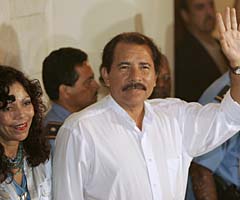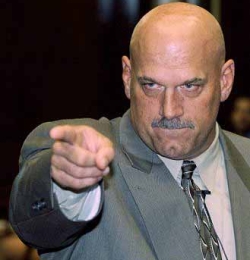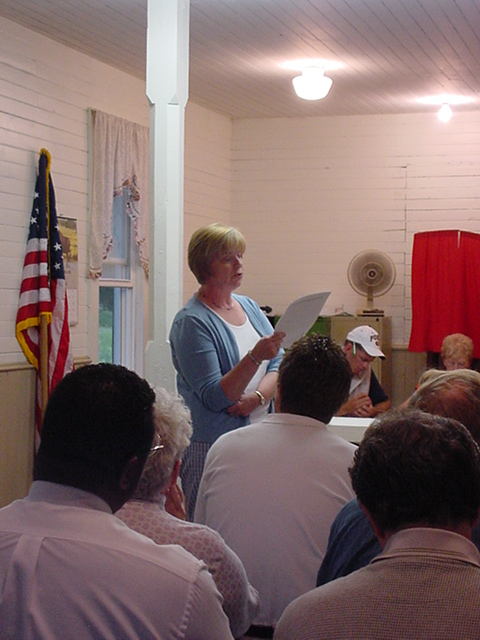Ortega wins!?! Can we? GO VOTE!
November 7th, 2006

(stolen from the STrib)
“No one wins until the electoral council says so,” Ortega said…
It’s going to be a long day Vote — and then do what you can to get out the vote!
Hatch: “I did NOT call her a …
November 6th, 2006
… bitch. My recollection was that I said she was acting like a dog,” Hatch told reporters on Friday morning — he denied a report that he had called her a “bitch” and insisted that he said “dog.” In the debate, Hatch was backing down, saying, “I’m not going to dispute it,” although he added that he doesn’t believe he used that language.
Kenya differed, noting, “Bark, bark bark, whiiiiiiiiiiiiine, bark, bark.”

Although Hatch several times described his recent responses to canines as “inappropriate” or “very inappropriate,” he said he did not feel that he needed to apologize to them. Kenya agrees, “Fuck ’em if they can’t take a joke. It’s hard to credibly dispute Hatch’s characterization!” Stunned, she shook her head, “Wait, who did I just send that to?”
The Against’em Communications report claims Hatch abruptly ended an interview with: ‘You’re nothing more than a bitch. Goodbye.’ He then hung up.” Ruff Rufus, Against’em Communications Capitol bureau chief, said he doesn’t know if Hatch was referring to Kenya personally or to Against’em Communications’ political leanings.
“We know he said it. But I’m not going to try to read anyone’s mind” about what he meant, Rufus said, adding that the accuracy of the quote is not in question, “The quote is accurate.” He declined to say whether a tape exists or to produce a tape or notes. “We do not talk about how we gather news,” Rufus said. But he did produce a 2003 letter regarding TRANSLink, on official Office of the Attorney General stationery and signed by Hatch, calling Kenya a “dog.”
“Hatch has a long history bullying and attacking those who question him,” said Republican Party of Minnesota Chairman Ron Uncaring. “Here he calls her a ‘bitch,’ and now we see that three years ago he called her a dog! We’ve also learned that four years ago, in Northfield, Kenya was handed off by Hatch to his side-kick Jacobson, a former K-9 officer, a clear case of illegal profiling.”
Rufus declined to provide any information about Kenya, stating only that she has pointy ears and a greying muzzle. and Kenya declined to answer questions. Kenya has worked at the Capitol for about a year for Against’em Communications, a chain that owns more than 20 newspapers that serve Minnesota, including the howFARwillweGO Against’em and the News Tribune. Notably, Kenya previously worked for the Red Wing Republican-Beagle, from which it could be infurred that she is indeed a dog.
Hatch has reportedly complained of conservative leanings and endorsements at Against’em Communications. Just one day before the Kenya-Hatch altercation, Rep. Bill Hilty-Jilty and Rep. Tommy Rukavina, exposed Against’em Communications orchestrated attempt at influence in the Thursday Letters to the Editor:
I have one question for the News Tribune editorial staff: What planet are you people living on? How could you possibly endorse Tim Pawlenty, a governor who has been a disaster for Northeastern Minnesota?
It’s clear that the owners of the News Tribune, Against’em Communications Company, headquartered in Fargo, N.D., have taken control over their local papers. In fact, I’ve read the editorials in other papers owned by the Against’em and these “local” editorials are almost identical when it comes to pushing for Pawlenty.
Republicans refused to address the influence of Against’em Communications and their pattern of endorsements, or their deflection of this appearance of influence.
When approached at the local Chuck & Don’s, Kenya remained non-plussed — she did not deny that she is a dog, nor did she deny that she is a bitch, and could not and would not criticize Hatch for speaking the truth. “Woof woof, woof woof woof woof,” she said, wagging her tail Anonymous sources have since confirmed that Kenya’s friend Krie was seen networking at the Hatch BarkBack and has formed a parade contingent of likeminded “Bitches for Hatch.” Krie, also a bitch, said “What this state needs is a WATCHDOG, not a LAPDOG! We need Hatch! GRRRRRRRRR, you got a problem with that?! Get over it! Now get out and VOTE!”

Katze weighs in: “I may be dead, and this ain’t Chicago, but I’m voting for Hatch too! This state’s gone to the dogs, and it’s up to us to fix it!”
Transmission Referendum – great idea!
November 6th, 2006
Update from Guy Wolf about Wisconsin transmission referendum… hmmmmmm, maybe we could do that here in Minnesota?ATC, American Transmission Company, the Wisconsin version of TRANSLink (the Xcel driven for-profit transmission company that couldn’t justify its existence to make it through PUC scrutiny) (so ME3, the Waltons, MCEA and George Crocker gave it to them in their TRANSLink deal and in Article 1 of the 2005 transmission bill – who do they think they are?) is facing a referendum on transmission. Why? Because ATC is proposing a large web of transmission lines through Dane County, and the citizens aren’t too happy with that. Here’s what they’re proposing:
Fitchburg-Verona Transmission Line
WOW, that’s a lot of transmission! These are the lines, the hub, that the transmission lines from the Dakotas through Minnesota will connect to. Here’s that CapX2020 map again:

Here’s the article Guy sent (when I went to the Cap Times to get the link, I was greeted by an ATC banner on top, oh barf):
ATC backs study request but exec says it’s not needed
JUDY NEWMAN 608-252-6156
November 5, 2006American Transmission Co. has taken out full-page ads in today’s Wisconsin State Journal and The Capital Times urging a “yes” vote on Tuesday’s Dane County referendum on power lines.
The referendum asks county voters whether a new, independent study should be conducted to see if the county truly needs more high-power transmission lines.
It’s not that the public utility company in charge of most of those towering lines in Wisconsin thinks the outcome will change. Mark Williamson, ATC’s vice president for major projects, called the referendum question “stupid” in a telephone interview Friday. He said it’s a moot issue because the state Public Service Commission will conduct a study before deciding whether the lines can be built.
“There has to be an independent study. The law requires the state Public Service Commission to perform such a review and certify that there is a need” in order to approve the projects, he said.
Transmission line skeptics, though, have been pressing for a new study and say a PSC review is not what they have in mind.
“There is no way the PSC can do an independent study that is comparable” to a comprehensive study by an independent consultant that was conducted nearly two years ago, said Robin Stearns, spokeswoman for Citizens for Responsible Energy, a coalition of citizen groups opposing new transmission lines. That study confirmed the need for new transmission lines, but opponents of the new lines say population and power use are not growing as quickly as had been projected.
The skeptics also say several proposed transmission projects in Dane County are each being handled separately, with separate studies – something, Stearns said, that won’t provide a comprehensive look at the county’s energy transmission needs and alternatives.
Williamson, though, is as sure as ever that up to $250 million in transmission updates “absolutely” will be needed to keep the power on in Dane County in coming years.
The referendum is advisory and has no force of law. It doesn’t include a price tag or indicate who will pay for the study. Williamson said a previous study cost more than $200,000.
The PSC doesn’t comment on issues pending before it.
Opening skirmish The ballot question comes as tensions mount over plans for one relatively small transmission proposal: an 8-mile stretch through Waunakee. The $11 million, 138-kilovolt line would run from the town of Vienna to the town of Westport.
It is seen as the opening skirmish of what’s expected to be an even bigger battle over the crown jewel of ATC’s local plans: a 345-kilovolt line that would form a 35- to 55-mile belt from west of Middleton to the village of Rockdale on Dane County’s eastern edge. There are three proposed routes for that line, and an application for the project won’t be submitted until March or April, Williamson said.
ATC has recommended $3.5 billion worth of upgrades and new transmission lines statewide through 2013. The utility company says the improvements are needed to keep the lights on as the population grows and residents fill their homes with big-screen TVs, multiple computers, extra freezers and other electrical devices.
In the Waunakee case, more than 85 families, organizations and governmental bodies have asked the PSC for permission to participate in the process as intervenors providing testimony – an unprecedented number, Williamson said. Even the bitterly contested Arrowhead- Weston case, which involved a 220-mile, 345-kilovolt transmission line from Duluth, Minn., to the Wausau area, drew 10,000 angry letters opposed to the line but only about 20 intervenors, he said.
Two groups requested funds from the PSC by September’s deadline to pay experts who will help them make their case against the proposed line in Waunakee. The Sierra Club will get $61,900 – about half the amount it sought – and Citizens for Responsible Energy, a coalition of citizen groups fighting the project, asked for $36,000 and will get $30,000, the PSC ruled last month.
“ATC has a lot of experts in- house and some other consultants outside. But if we’re going to put on a case, we need experts as well, and they’re not cheap,” said David Bender, of the Garvey McNeil & McGillivray law firm in Madison, representing the Sierra Club.
The intervenor requests come from more than 60 residents or families, neighborhood groups as far south as Oregon, utility companies, political groups and Dane County, the city of Madison and the village of Waunakee. Not all are opposed to the project.
“We think that line is needed for local (electrical) load serving and reliability needs in the Waunakee area,” said Scott Neitzel, Madison Gas & Electric’s vice president for energy supply policy.
No additions have been made in 30 years to Dane County’s network of high- voltage lines, and Waunakee has been served by a transmission line that dates back to the 1930s, said Sarah Justus, an ATC spokeswoman.
Questions challenged In the past several weeks, at least half a dozen residents who applied to participate in the case have pulled out. Stearns, a spokeswoman for Citizens for Responsible Energy, thinks she knows why.
“Every individual who’s intervened was served an interrogatory (by the ATC) . . . a 16- page document filled with questions that demanded information like how many light bulbs do you have in your house? How many EnergyStar appliances? They demanded five years of back electric-use records. It’s all information that is completely inappropriate and irrelevant to the case but is designed to intimidate,” Stearns said.
State Rep. Sondy Pope- Roberts, D-Verona, was so incensed by the lengthy documents – part of what she called repeated attempts by ATC to block public input – that she said the questionnaire “borders on abusive use of power” in an Oct. 30 letter to ATC.
Williamson, though, said both Pope-Roberts and the public are misinterpreting the role of intervenors in PSC cases. They are usually lawyers, and they provide hard data on the “nuts and bolts” of utility proposals, such as the impact of potential sites and routes on wildlife, the environment and the project’s engineering requirements. Their comments come during the state’s technical hearings, Williamson said.
“We urge the members of the public to participate in the . . . process but suggest that their participation would likely be most appropriate in the public hearing,” Williamson said, in a Nov. 2 letter responding to Pope-Roberts.
The PSC has scheduled technical hearings on the Waunakee line in January and February 2007. Public hearings are set for Feb. 3 and 5.
Conservation debated Meanwhile, edgy e-mails also have been flying back and forth between Williamson and Jerry Mendl, an independent energy consultant who recently said Dane County may be able to put off new transmission lines for 10 years or more if residents cut their power use enough.
Mendl, president of MSB Energy Associates in Middleton, was the key author of a study nearly two years ago that confirmed the need for major new transmission lines in Dane County. He now says the population and power use are not growing as quickly as projected, while at the same time, the public has become more interested in conserving energy and more state money is available for energy efficiency and renewable power projects.
Williamson, in a Nov. 3 e- mail to Mendl, agreed that “real, concerted and measurable conservation efforts” could “possibly postpone the need for additional lines yet-to-be proposed.
But he wrote, “conservation will not alleviate the need for the current round of Dane County projects.”
Next steps Technical hearings on the proposed 138-kilovolt line in the Waunakee area are scheduled in January and February. Public hearings will be held Feb. 3 and 5. A decision from the Wisconsin Public Service Commission is expected in spring 2007.
In a separate case, ATC is proposing a 345-kilovolt transmission line from west of Middleton to Dane County’s eastern edge. ATC plans to narrow the list of possible routes for that line from three to two and file an application with the PSC on that proposal in March or April. For more information, go online to psc.wi.gov or call 608-266-5481 or 888-816-3831.
Another one, from a couple weeks ago, brings out the irony in this. The lines go through the Belleville neighborhood of “an engineer whose name I can’t recall” and in West Middleton, right by MSB Energy Assoc., known for being expert witnesses against transmission projects, i.e. David Schoengold was one of my witnesses in the SW MN 345kV case. Mendl, the “Key Author” is a principle of MSB, the “M” and Schoengold is the “S”:
Expert: Update powerline study
Key Author Questions Need For New Power Lines
Wisconsin State Journal :: BUSINESS :: C10
Tuesday, October 24, 2006
JUDY NEWMAN jdnewman@madison.com 608-252-6156
The key author of a report nearly two years ago that said Dane County needed major new transmission lines by 2011 to keep the lights on now says those high-voltage lines may not be needed after all — or, at least until 2020 — if residents cut their electricity use enough.Jerry Mendl, president of MSB Energy Associates, a Middleton consultant firm, says so many things have changed since the study was released that the initial findings may no longer apply.
Mendl sent an e-mail Thursday to members of the Energy Initiative — 11 utility companies and citizen groups involved in the 2004 study — saying both electricity use and population are growing at slower rates than earlier projected.
At the same time, more power plants have been built and more money is available for energy efficiency programs. And, with numerous groups fighting a proposed 35- to 55-mile, 345-kilovolt line across Dane County, more residents might be willing to take steps to cut their power use, Mendl said.
Enough to eliminate the need for the line?
“I think there’s a chance for that, yes,” Mendl said.
He said it’s not clear yet how much electricity use would have to be reduced.
“If you cut it down to a 1 percent growth rate, it moves from 2011 to 2020 or later before you run into the same level of urgency” for new transmission, he said.
Mendl said he’d like to reconvene the Energy Initiative group, expand it to include some of the citizen opposition groups and conduct an updated study.
If that happens, American Transmission Co. — which owns and oversees much of the transmission grid carrying power into and around the state — would not object.
“We’re certainly not going to stop anything,” said Mark Williamson, ATC’s vice president for major projects. But he said he’s confident the result won’t change.
“We know the facilities are desperately needed,” Williamson said.
Reaction from environmental groups is mixed.
“I think Jerry’s logic was impeccable,” said Michael Vickerman, executive director of RENEW Wisconsin. “We think a new study is called for.”
Not only is electricity use growing at a lower rate, but home construction nationwide is “beginning a massive slowdown,” Vickerman said. “If people who want to move to Wisconsin can’t sell their homes in New Jersey, they’re not going to move to Wisconsin.”
But Steve Hiniker, executive director of 1,000 Friends of Wisconsin, said he sees no need for another study, even though he opposes the 345-kilovolt line.
“It makes absolutely no sense to spend another penny updating this because we know what the arguments are,” Hiniker said. “The updated arguments should be brought before the Wisconsin Public Service Commission, where the decision is going to be made.”
ATC paid for the first study, which cost at least $200,000, Williamson said, from charges to ratepayers.
Mendl’s recent e-mail also suggests new transmission line technology could help cut the need for new lines — a recommendation that also came from a group of Madison and Dane County public officials.
But Williamson said the aluminum-conductor-composite-reinforced line won’t handle Dane County’s power needs. “It’s dandy stuff if you’re trying to fix a fairly short span of wire; we’ve used it in several places in our system. But it won’t solve a fundamental overload problem for growth, and that’s what we’re faced with,” he said.
Another potential hitch: Madison Gas & Electric has said it plans to shut down much of the coal-fired Blount Street power plant within six years and convert the rest to burn natural gas.
But Mendl, a former PSC administrator, said use of that aging power plant is essential to maintain Madison’s electricity flow and without it, more high-voltage transmission lines on the outskirts — or even within Madison — may be needed, anyway.
Dane County voters will be asked on the Nov. 7 ballot if they support an independent study of how to address Dane County’s future electricity needs.
More hot air about CO2
November 5th, 2006
It’s debate time… it drives me crazy…
The question was whether they believed that global warning is a problem and what they’d do about it. Not one of the three candidates said one word about closing down CO2 generating coal plants, and not one candidate said one word about renewable energy planning and siting so that the thousands of coal plants in the permitting process now and in the immediate future would not be built. Not a word. All focused on a CO2 market, where those who pollute would pay a high price for their emissions — it assumes, assures continued emissions and does nothing to reduce CO2 emissions. What does promotion of a CO2 market do to concretely reduce global warming?
The question I want answered:
Do you believe global warming is a problem, and what would you do about reducing CO2– in answering this, address reductions in CO2, not CO2 credits that shift and tax emissions, but net reductions.
And a question from the audience that was so extreme. It’s a guy saying we have a 13% annual electricity growth, forecasting rolling blackouts, we need to build generation, blah blah blah. What a load of shit.
Pawlenty is going on about baseload capacity, clean burning facilities and for course he means… not just the Benson turkey turds plant, but Mesaba, “a new technology that’s on the drawing board” in NE Minnesota WHICH HE DID NOT ADDRESS BY NAME! Yup, we know it’s Excelsior’s Meaba coal gasification project and that Pawlenty’s distancing himself from it. Hatch says 3,500MW by 2015 (HUH? but it’s better than 6,300MW or 8,000MW but where did that come from?), that we have to go to alternative energy, he supports renewable mandate of 20% by 2020, and he’s talking up wind, that we have issues with transmission which we’ll have to deal with, wants long term subsidies for wind, building code standards. Hutchinson says don’t expand demand, because the most ready source is conservation and make it economically rewarding, and he’s got a 2% annual conservation plan, and he’s particularly concerned that we need to address all the power plants that need to be replaced, because there is no plan, and we have to do this or we will simply replace in kind and that’s something we should be afraid of
================================
Pawlenty just said we got rid of the Profile of Learning and got some other standards. HUH?
Oh, this is infuriating, now Pawlenty is talking about putting on a property tax cap, and even my grrrrrrrrrls don’t like that one, they jumped up and started growling! Here the state funding is cut and shifted to local governments, and so where are we supposed to get it to cover local necessary services? This is so dishonest.
And now Pawlenty’s trying to say that people weren’t booted off Minnesota Care. Give me a break…
“To argue that we should make things better isn’t criticism, it’s leadership.” Nice phrase from Hutchinson.
“Do you accept any responsibility for the property tax increases?” And Pawlenty talks his way around and around and around and misrepresents LGA cuts, which are only a part of it.
================================
Let’s just set up a ring and let them duke it out. Oh, I miss Jesse! There a lot to be said for a no-bullshit direct approach.

Rural Waseca’s Nancy Prehn in the news
November 5th, 2006

Nancy Prehn speaking at Blooming Grove Town Hall about the Simon Industries 325MW natural gas plant (she and Kimber were my clients on that one — note the utility personal property tax was pushed into Host Fee Agreement mode and there is no power plant).
Campaign managers say they help candidates concentrate on the issues
By Pauline Schreiber
FARIBAULT – Bill Favro mailed 800 handwritten postcards Friday, which reminded people to vote on Nov. 7.
“It’s been an interesting learning experience to have served as campaign manager for Otto Luknic. I’ve learned how politics works at the grassroots level, which is really what state representative, state senate, county positions, city council and school board seats are about,” Favro said. “They are at a level where a candidate can go door-to-door and meet with voters. It’s a lot different than national candidates that depend a lot on TV ads.”
Favro considers himself an Independent when it comes to politics. But when Luknic, the Republican challenger to District 26B State Rep. Patti Fritz’s seat asked him in March to be his campaign manager, he could not refuse his former high school teacher and long-time friend.
“Basically what a campaign manager does is handle the details of the campaign so a candidate can concentrate on campaigning rather than concern themselves with preparing campaign signs, literature, ads, and also recruiting and coordinating volunteers and organizing fundraising,” Favro said.
The job is a volunteer position, so Favro’s life has been very busy since he agree to be Luknic’s campaign manager in March. He works full-time at his family’s business, the Humphrey Man-Lift Co. on Minnesota Highway 60, west of Faribault.
“The job of campaign manager really involves more time than I thought it would. I’d say that it has amounted to 10 to 15 hours of work many weeks, but other weeks (it’s totaled) just a few hours,” he said.
He added, “My wife, Jennifer, is looking forward to the election being over next Wednesday, so I won’t always have something to do for the campaign, as it seems I’ve had for the past nine months. But I’ve enjoyed it. It’s been a great learning experience. I’m not sure I’d do it again, but if I did, I could likely do it all more efficiently.”
Close at hand
Jim Fritz served as the campaign manger for his wife, Patti Fritz, when she ran two years ago and unseated Lynda Boudreau, then Republican incumbent District 26B state representative, and again this election year.
“It’s worked out very well. Who knows Patti better than me? So my job is getting her out to events and helping her door-knock,” said Jim Fritz, a retired Faribault firefighter. “I work in the background, however. I don’t like to stick out. I want Patti to be the focus.”
Eller’s manager
Nancy Prehn of Waseca found her life extremely busy, since early this year when she agreed to be Democrat Jeremy Eller’s campaign manager, also a volunteer position. Eller of Faribault is trying for a second time to unseat incumbent Republican District 26 State Senator Dick Day of Owatonna.
Prehn, a school paraprofessional with the Waseca District, defined the role of campaign manager as “working for a candidate and doing things to make it easier for him, so he doesn’t have to worry about all the details related to the campaign.”
She lined up fundraisers, arranged for units to be in community parades, and various other campaign events.
“I also recruited volunteers to help with the campaign. But often people would call me up to offer their help with putting out signs and other activities, so it really wasn’t hard to find volunteers,” Prehn said.
Something lacking is a manual for political campaign managers, she said. “I just used a lot of honesty and kindness, no matter what side of the fence people were on. Everyone’s views should be respected.”
Besides heading Eller’s campaign this election year, Prehn is herself running for a spot on the Waseca County Board.
“I’m a high-energy person to begin with. So, yes, it’s been very busy for me. However, I’m glad I did it. It’s been a wonderful experience for me. I met some very thoughtful people,” Prehn said.
No manager
Dick Day has no campaign manager, but heads up his own campaign with the help of his wife and children.
“Back when I first ran in 1990 I had a campaign manager. I spent more time talking to the campaign manager, and then to the campaign committee, it seemed a waste of time. So since then I’ve been doing it myself with the help of my family,” Day said. “I have a few friends that always help put up campaign signs. But after that, each Saturday I drove around to make sure the signs are OK.”
What helps, Day said, is that the Republican Caucuses offers help with mass mailings of campaign literature.
“We pay for it, but they have different formats and we put together what we want to say on it. My wife handles all the money, but we do hire an accountant to do the campaign funding reporting and accounting that’s required by state law. Mostly, however, we do the campaign as a family. I go to radio stations for interviews. I always like it to be me who is talking about what I believe and what issues I feel are important.”
Day said he has no opinion as to whether it’s better to do a campaign yourself, or have a campaign manager oversee it.
“For me, it just works to do it myself,” he said.
– Staff writer Pauline Schreiber may be reached at 333-3127 or pschreiber@faribault.com.